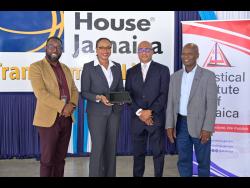By David Apinga,Eric Akuamoah
Copyright myjoyonline

The passing of Apostle Kwadwo Safo Kantanka, the esteemed founder and leader of the Kristo Asafo Mission of Ghana, marks not merely the conclusion of an individual’s life but the closing of a significant chapter in the narrative of modern African religious and technological history.
Apostle Kwadwo Safo Kantanka was not just a religious figure; he stood at the intersection of faith, innovation, and cultural identity, shaping the philosophical landscape for many in Ghana and beyond.
His ministry was characterized by a unique, often controversial, and profoundly impactful synthesis that defied easy categorization, cutting across the multifaceted domains of charismatic Christianity, technological innovation, and cultural nationalism.
The theological framework underpinning the Kristo Asafo Mission, also known as the Christ Reformed Church, was notably distinct from mainstream Pentecostal or charismatic movements.
While many such movements often emphasize a strict adherence to traditional biblical doctrine, Apostle Safo’s approach drew from a deep reservoir of indigenous African worldviews, enabling a rich tapestry of beliefs that resonated with the everyday lives of his followers.
His theology was fundamentally pragmatic and holistic, embodying a worldview that embraced the totality of human experience and existence. He vehemently rejected the Western imposed dichotomy between the sacred and the secular, as well as the spiritual and the scientific.
For Apostle Kwadwo Safo Kantanka, divine revelation transcended the boundaries of biblical hermeneutics, extending directly into the realms of invention, innovation, and material production.
He viewed the act of creating as a reflection of divine will, positing that God, as the ultimate creator, endowed his chosen servants with the wisdom to create and innovate for the betterment of humanity, particularly for the African continent.
This belief system highlights a significant aspect of his ministry, where technological advancement was not merely seen as a pursuit of progress but rather as a form of worship and a vital pathway to African liberation, empowerment, and self determination.
Scholar Paul Gifford encapsulated this distinctive approach in his seminal work, “Ghana’s New Christianity,” aptly describing Apostle Safo as “a man of God and a man of technology.”
This description underscores the dual role Apostle Kantanka played in the lives of his followers and the broader community. He encouraged a belief in the transformative power of technology, urging his followers to embrace it as a means of divine expression and societal advancement.
Consequently, his legacy is not only one of spiritual leadership but also of pioneering an approach that interwove faith with practical and technological development, thus leaving an indelible mark on the landscape of modern African religion and innovation.
Spiritual Prowess and Charismatic Authority
Apostle Safo’s authority was rooted in a demonstrated spiritual prowess that resonated deeply within a cultural context that acknowledges the continuous intervention of the spiritual in the material world.
His ministry was characterized by claims of extraordinary miracles and divine manifestations that cemented his status as a prophet and a man of God. Examples abound, from testimonies of healing incurable diseases to more dramatic displays such as claims of teleportation, spiritual transportation, and divine protection from physical harm.
These acts were not performed in isolation but were integral to his narrative of being a special vessel chosen by God for a specific mission to Africa.
This charismatic authority, as described by Max Weber’s framework, was foundational. It granted him the legitimacy to venture into the unconventional territory of technology manufacturing, with his followers viewing his inventions as extensions of his divine anointing.
His spiritual claims provided the sanctity and credibility that underpinned his entire project, making the technological arm of Kristo Asafo an article of faith itself.
Apostle Safo’s impact extends beyond the spiritual realm; he has cultivated a community that not only believes in his spiritual divinity but also participates actively in the economic development he promotes. His initiatives in technology manufacturing have led to the establishment of various industries that aim to provide employment and boost local economies.
The belief held by his followers that his technological endeavors are divinely inspired drives their commitment to supporting these ventures.
Moreover, his approach to technology is not merely about innovation; it also encompasses a broader philosophical perspective that intertwines faith and science. Apostle Safo’s teachings emphasize that true technological advancement must be grounded in moral and spiritual values.
His ministry thus engenders a worldview where faith in spiritual authority coexists with a belief in practical and tangible progress through technology.
In a cultural landscape where the spiritual and material are often seen as dichotomous, Apostle Safo’s work allows for a synthesis that redefines the roles of faith and innovation. This unique alignment positions him as not only a religious leader but also an influential figure in the landscape of contemporary African enterprise.
His narrative challenges the often held perception that religion and modernity are incompatible; instead, it presents a model where faith fuels the pursuit of scientific and technological advancement, making his authority multifaceted and deeply interwoven with the aspirations of his followers.
Technological Productions: A Vision for African Self Sufficiency
The most visible and debated aspect of Apostle Safo’s legacy is his foray into technology, a field in which he labored diligently to foster and showcase African innovation.
Under the Kantanka Automobile brand and related ventures, he oversaw the production of an impressive range of goods, all intended to reinforce and demonstrate a sense of African self sufficiency in the face of a global landscape where dependency on foreign imports is often the norm.
His inventions stood as tangible manifestations of his underlying philosophy, which consistently challenged and redefined the mainland’s perceived reliance on Western and Eastern imports, positioning African made products as viable and competitive alternatives.
Key productions included:
Kantanka Vehicles: The cornerstone of his automotive ambition was the Kantanka Vehicles line. This flagship offering presented a diverse array of SUVs, saloons, and pickup trucks. Notable models such as the Kantanka Omama, the Kantanka Nsoromma, and the Kantanka Odeneho showcased not only aesthetic appeal and functionality but also underscored the brand’s commitment to local materials.
In addition to their impressive design, these vehicles were marketed with claims of innovative features, including state of the art security systems, exemplified by voice activated ignition.
Furthermore, tales of the vehicles having spiritual protection added an intriguing dimension to the automotive experience, promoting a fusion of modern technology with traditional beliefs.
Consumer Electronics: Beyond vehicles, the Kristo Asafo Mission also extended its reach into consumer electronics with Kantanka branded televisions, amplifiers, and various other electronic devices.
These products were often launched amid grand ceremonies at the mission’s annual “Technology Exhibition.” These events seamlessly blended elements of worship with cultural displays and product launches, creating a vibrant atmosphere that celebrated both faith and innovation.
Agricultural Innovations: True to his message of holistic self reliance, which merged spiritual, cultural, and economic empowerment, Apostle Safo not only focused on technology but also made significant strides in agricultural development.
He created and promoted various agricultural tools and techniques that encouraged modernized farming practices grounded in indigenous knowledge and local context. This commitment to agricultural innovation was an extension of his overarching project of fostering independence and sustainability within African communities.
These endeavours, while appearing commercial, were deeply rooted in ideological significance. Their merit lay not solely in their economic viability but rather in their symbolic power to inspire a sense of genuine pride and ownership among Africans.
As noted by Africanist scholars, such as Cameroonian anthropologist, Francis B. Nyamnjoh, innovation within Africa often entails a process of “domestication,” wherein foreign technologies are reconfigured and adapted to fit local logics, values, and cosmologies.
Kantanka’s projects went even further, attempting to forge an indigenous technological lineage from the ground up, effectively asserting that Africans could indeed be originators, innovators, and not just passive consumers of external technologies.
Championing African Sovereignty in Religion and Culture
Apostle Safo Kantanka emerged as a staunch advocate for African sovereignty, a complex project he passionately pursued across multiple domains; technology, culture, and religion.
His ministry was unequivocally a powerful act of cultural nationalism. Unlike many contemporary Christian leaders who may seek to create a separation between their faith and pre-Christian African traditions, Kantanka took a different approach by deliberately and creatively integrating those traditions into his religious practices.
He argued compellingly for the recognition of African divine heritage, frequently stating that God communicated with Africans through their own cultural idioms long before the arrival of European missionaries.
This blend of tradition and modernity was especially evident in various practices within the church:
Liturgy and Symbolism: Kristo Asafo services were notable for their rich incorporation of Ghanaian traditional music, drumming rhythms, and dance sequences that resonated with congregants.
Clergy often wore robes inspired by the vibrant patterns of Kente cloth, symbolizing a powerful fusion of clerical duties with the values and traditions of royal African authority.
This melding of cultural elements created a unique and engaging worship experience that deeply resonated with attendees, further reinforcing their cultural identity during spiritual gatherings.
Theological Reinterpretation: Apostle Safo continually sought to reinterpret biblical stories through an African lens. He posited that many significant events depicted in the Bible took place on African soil and involved Africans themselves.
This was more than a mere theological stance; it was an earnest effort aimed at reclaiming Christian history for the African continent while simultaneously working to decolonize the faith from historically ingrained Eurocentrism.
Nomenclature and Identity: The name “Kristo Asafo,” which translates to Christ Reformed Church, encapsulated a broader mission aimed at creating a uniquely African expression of Christianity.
His self proclaimed title, “The Star of Africa,” expressed a profound commitment to affirming cultural pride and identity.
Furthermore, the naming of his products with Ghanaian words such as “Nsoromma,” which means star, and “Odeneho,” meaning champion symbolized conscious acts of cultural assertion and pride, crafting a narrative around African excellence and ingenuity.
Apostle Safo’s mission transcended mere religious pursuits; it represented a holistic decolonial project aimed at dismantling the remnants of colonial mentality in African societies. It sought to break what Kenyan writer Ngũgĩ wa Thiong’o eloquently describes as the “colonization of the mind,” by powerfully demonstrating that spiritual power, technological capability, and cultural excellence are innate to the African spirit.
Through this comprehensive approach, Apostle Safo Kantanka truly carved out a significant legacy that continues to inspire efforts towards self determination and empowerment across the continent today.
Conclusion: The Enduring Legacy of the Star of Africa
Skepticism regarding the authenticity and economic viability of Kantanka’s technological productions was a constant feature of his public life.
The doubts cast by critics were numerous and multifaceted, questioning not only the originality of his inventions but also their practicality and relevance in a global context dominated by established automotive giants like Toyota, Mercedes, and Tesla amongst others.
Many detractors went so far as to label his creations as mere assembled imports rather than genuine innovations, suggesting that his work was little more than a patchwork of existing technologies rather than groundbreaking advancements in engineering or design.
Yet, this skepticism largely missed the essence of his project and the deeper significance of his contributions.
Apostle Safo Kantanka was not primarily an industrialist in the conventional sense; he did not aspire to compete head to head with global corporations for market supremacy. Instead, he was a prophet and a symbolist, embodying a vision that transcended the mere sale of products.
His aim was not market dominance but rather what can be described as inspirational sovereignty.
He sought to impart a belief in the capacity and capability of the African mind, showcasing that it has the potential to conceptualize, design, and construct complex technological systems independently.
The very persistence of Kantanka in the face of doubt and derision serves to magnify the significance of his stance. He embraced the challenges and criticisms with unwavering commitment, continuously producing, exhibiting, and preaching his message of self belief and empowerment.
In doing so, he became a living symbol of potential and possibility; a beacon of hope for many who looked to him for inspiration and validation of African ingenuity and creativity.
In conclusion, Apostle Kwadwo Safo Kantanka was indeed the “Star of Africa” he boldly proclaimed himself to be. His life and work serve as a testament to a radical and integrated vision where faith beautifully interweaves with innovation, and where innovation itself can serve as an expression of faith.
This synergy was all rooted in a proud and unashamed embrace of African identity and potential. Reflecting on Paul Gifford’s insightful description, he was truly a singular fusion; a man of God and a man of technology, seamlessly blending spirituality with the pursuit of scientific and technological advancement.
His legacy serves as a challenge and an inspiration for future generations of Africans. It calls upon them to dismantle the artificial boundaries that have historically separated spirituality from science and to harness their indigenous knowledge systems.
In doing so, they may boldly embark on a relentless pursuit of comprehensive self-sufficiency that transcends the economic limitations imposed by global markets. Although the Star of Africa may have seemingly set, the enduring light of his ambitious vision continues to inspire countless individuals, inviting them to dream, innovate, and believe in their own capabilities.
Written by Eric Akuamoah-Boateng



